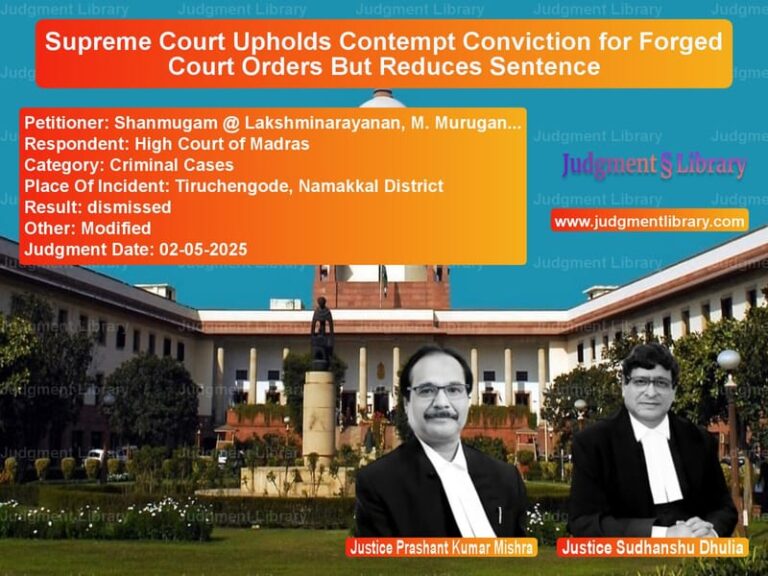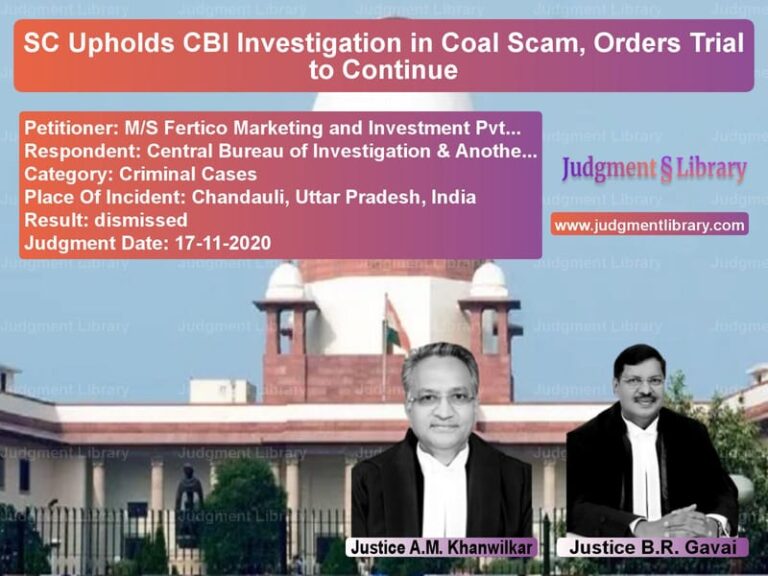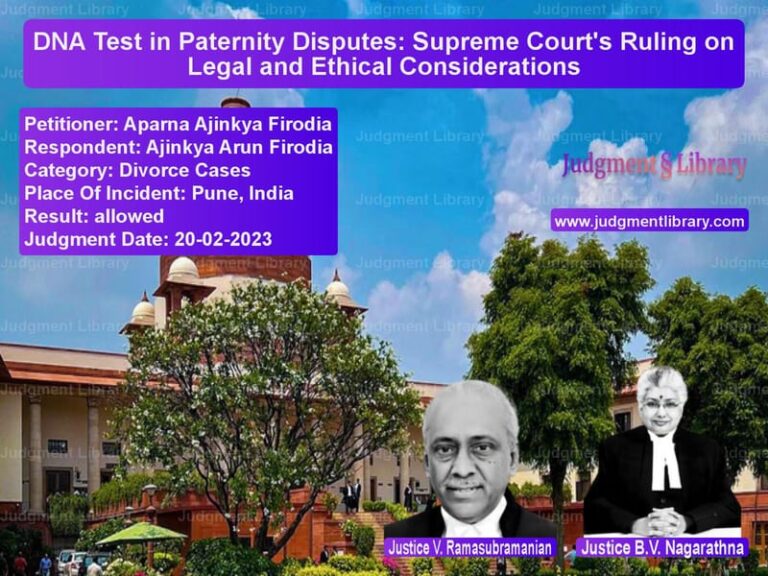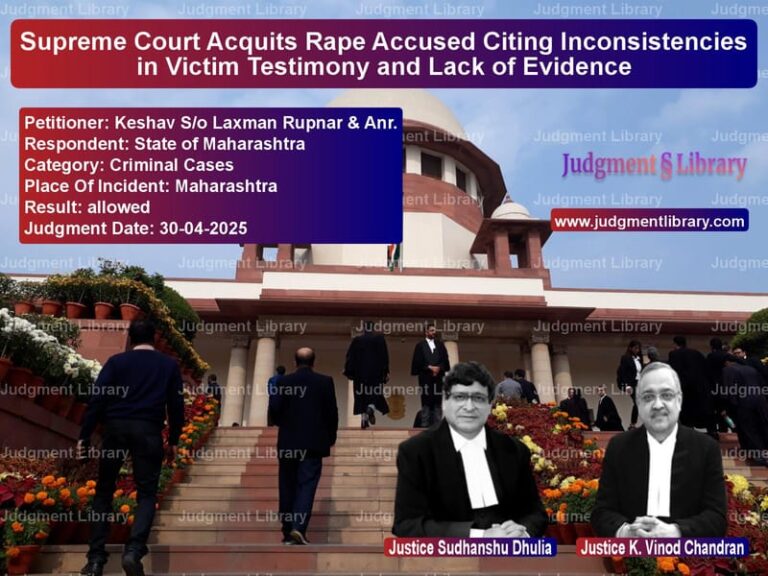NDPS Act Case: Supreme Court Acquits Accused Due to Procedural Lapses
The case of Vijay Pandey vs. State of Uttar Pradesh highlights the significance of procedural compliance in cases under the Narcotic Drugs and Psychotropic Substances Act, 1985 (NDPS Act). The Supreme Court overturned the conviction of the accused due to the failure of the prosecution to establish a clear chain of custody for the seized narcotics.
The accused was sentenced to 15 years in prison along with a fine of Rs. 1,50,000 under Section 31 of the NDPS Act. However, the Supreme Court found critical lapses in the investigation, including the absence of independent witnesses, failure to follow Section 50 of the NDPS Act, and lack of proper identification of the seized sample.
Background of the Case
The case began when Vijay Pandey was allegedly caught carrying a plastic flour packet containing 10 kg of opium. The prosecution’s case was primarily based on police witnesses, with no independent witnesses from the locality included in the investigation.
The key points of contention in the case were:
- The accused was allegedly apprehended outside his house with a packet containing opium.
- The police officers conducting the seizure did not secure any local independent witness.
- There were inconsistencies in the evidence regarding whether the sample tested was the same as the one seized.
- The defense argued that the accused was falsely implicated.
Petitioner’s Arguments
The appellant, Vijay Pandey, challenged the conviction on the following grounds:
- He was apprehended without any independent witnesses in a residential area.
- There was non-compliance with Section 50 of the NDPS Act, which requires proper procedural safeguards for searches and seizures.
- The prosecution failed to establish that the sample tested in the forensic laboratory was the same as the one allegedly seized from him.
- The trial court and the High Court failed to address the inconsistencies in the evidence.
Respondent’s Arguments
The State of Uttar Pradesh argued that:
- The accused had a history of prior convictions under the NDPS Act.
- The police officers’ testimonies were sufficient to prove the case beyond a reasonable doubt.
- The failure to secure independent witnesses was not fatal to the prosecution’s case.
- The trial court had confirmed that the sample produced in court was the same as the one seized.
Supreme Court’s Observations and Judgment
The Supreme Court, in its judgment delivered by Justice Navin Sinha and Justice Ashok Bhushan, found several procedural deficiencies in the prosecution’s case.
Failure to Secure Independent Witnesses
“We find it difficult to believe that in a rural residential locality, the police were unable to find a single independent witness.”
The Court noted that no effort was made to include a local witness or explain why independent witnesses were unavailable.
Non-Compliance with Section 50 of the NDPS Act
“The High Court, despite noticing the absence of any recovery memo prepared at the time of search and seizure under Section 50 of the NDPS Act, opined that the deposition of the police witness to that effect was sufficient compliance.”
The Court reiterated that compliance with procedural safeguards is essential for a fair trial.
Failure to Establish Chain of Custody
“The failure of the prosecution in the present case to relate the seized sample with that seized from the appellant makes the case no different from failure to produce the seized sample itself.”
The Court found that the prosecution failed to prove that the sample tested in the forensic lab was the same as the one seized from the accused. The trial court had also acknowledged that the malkhanas (storage rooms) in Uttar Pradesh were in miserable condition, which raised further doubts about the integrity of the sample.
Importance of Proving Guilt Beyond a Reasonable Doubt
The Court cited the case of Mohan Lal vs. State of Punjab (2018) to emphasize that the burden of proof does not shift to the accused unless the prosecution first establishes a prima facie case beyond a reasonable doubt.
Final Ruling and Impact
The Supreme Court ruled:
- The prosecution’s failure to prove that the seized sample was the same as the one tested was a critical flaw.
- The conviction by the trial court and upheld by the High Court was unsustainable.
- The accused was acquitted and ordered to be released unless wanted in any other case.
Legal Precedents Considered
The Court referred to previous cases that emphasized the importance of procedural compliance:
- Vijay Jain vs. State of Madhya Pradesh (2013) 14 SCC 527: Stated that the prosecution must establish a clear link between the seized material and the forensic report.
- Ashok alias Dangra Jaiswal vs. State of Madhya Pradesh (2011) 5 SCC 123: Held that non-production of the seized material in court weakens the prosecution’s case.
- Jitendra vs. State of Madhya Pradesh: Stressed that oral evidence alone is insufficient if the seized material is not produced as a material exhibit.
Implications of the Judgment
This ruling reinforces the principle that:
- Strict procedural compliance is essential in NDPS cases.
- Failure to secure independent witnesses can raise doubts about the fairness of the investigation.
- Maintaining a clear chain of custody for seized materials is crucial for proving guilt beyond a reasonable doubt.
- Prior convictions cannot be the sole basis for conviction in a new case.
Conclusion
The Supreme Court’s judgment in Vijay Pandey vs. State of Uttar Pradesh serves as a strong reminder that procedural lapses cannot be overlooked in NDPS Act cases. By acquitting the accused due to lack of proper evidence, the Court reaffirmed the importance of upholding fair trial principles. The ruling ensures that cases under the NDPS Act must meet strict evidentiary standards before an accused can be convicted.
Petitioner Name: Vijay Pandey.Respondent Name: State of Uttar Pradesh.Judgment By: Justice Navin Sinha, Justice Ashok Bhushan.Place Of Incident: Uttar Pradesh, India.Judgment Date: 30-07-2019.
Don’t miss out on the full details! Download the complete judgment in PDF format below and gain valuable insights instantly!
Download Judgment: Vijay Pandey vs State of Uttar Prade Supreme Court of India Judgment Dated 30-07-2019.pdf
Direct Downlaod Judgment: Direct downlaod this Judgment
See all petitions in Drug Possession Cases
See all petitions in Judgment by Navin Sinha
See all petitions in Judgment by Ashok Bhushan
See all petitions in dismissed
See all petitions in supreme court of India judgments July 2019
See all petitions in 2019 judgments
See all posts in Criminal Cases Category
See all allowed petitions in Criminal Cases Category
See all Dismissed petitions in Criminal Cases Category
See all partially allowed petitions in Criminal Cases Category







